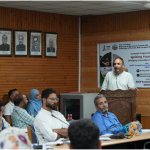As the winter season arrives, the valley of Kashmir turns into a mystic wonderland, with temperatures dipping to sub-zero levels. This climatic harshness brings forth several challenges, among which ensuring the quality of food supplies is a critical one that requires urgent attention. Food quality control, essentially the process of guaranteeing the safety, wholesomeness, and nutritional value of food, becomes crucial during the harsh winter months in Kashmir – particularly in cut-off areas. The valleys geographical isolation due to heavy snowfall often leads to limited access to fresh food supplies. As a result, people tend to stock up on food, with much of it being preserved and canned, thus increasing the chances of food spoilage and contamination. The importance of food quality control is not merely restricted to preventing food borne illnesses. Ensuring the nutritional value of food is also essential. During winter, the body needs more calories to stay warm, necessitating a diet rich in nutrients. Consumption of low-quality, nutrient-depleted food may result in malnutrition, decreased immunity, and increased vulnerability to various diseases. Maintaining food quality control in the valley is a shared responsibility among government agencies, food businesses, and consumers. The government should ensure stringent checks on the quality of food items reaching the market, especially during the winter season when the shelf life of perishables drastically reduces. Furthermore, there should be consistent monitoring of storage facilities to prevent the growth of harmful bacteria or fungi due to improper storage. Food businesses, including vendors and retailers, should abide by the food safety standards set by regulatory authorities. They must ensure proper handling, storage, and transport of food items to avoid any possible contamination. It is equally essential for consumers to be vigilant about the food they purchase and consume. They should ensure that the food products are properly sealed, are within their use-by dates, and are stored correctly. Education and awareness are crucial in this aspect. The government, along with various non-profit organizations, should run awareness campaigns about the significance of food quality and the potential risks associated with its negligence. The campaigns should also instruct people on how to properly store food, especially during the winter season. Also, investing in food testing labs in the valley could also significantly aid in maintaining food quality. Such labs can provide timely and accurate information about the nutritional content and potential contamination in food products, enabling necessary actions to be taken swiftly. As we brave another winter in Kashmir, it is a fundamental right for everyone to have access to safe and nutritious food. The government and the concerned authorities need to ensure that winter in Kashmir remains not just a spectacle of natural beauty but also a season of wellness and good health for all its residents.
Ensure food quality control in winter period

Sign Up For Daily Newsletter
Be keep up! Get the latest breaking news delivered straight to your inbox.
By signing up, you agree to our Terms of Use and acknowledge the data practices in our Privacy Policy. You may unsubscribe at any time.
Leave a Comment
Leave a Comment
Stay Connected
Latest News
Recent Posts
- Govt committed to improving people’s lives: Javed Rana
- AIFOF office bearers call on Rana
- Shri Buddha Amarnath Yatra : CCTV cameras installed along 14 km route
- Outreach prog for agri start-ups under JKCIP begins at SKUAST-K
- IUST organises workshop to strengthen institutional readiness for NAAC reassessment







